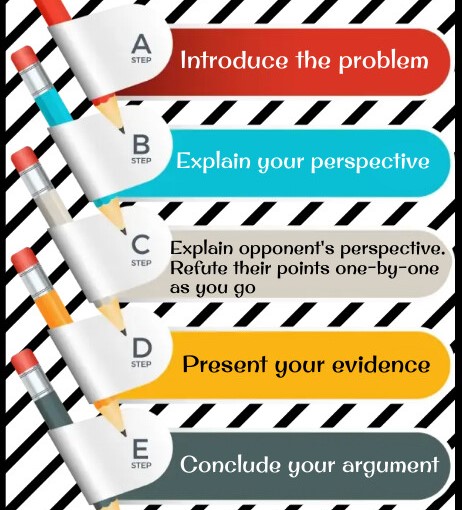Nursing is a profession built on critical thinking, compassion, and unwavering dedication to patient care. These qualities are also essential for excelling in argumentative nursing essay writing. Beyond simply presenting information, writing an argumentative nursing essay challenges you to analyze complex issues, formulate well-supported arguments, and persuade your readers to consider your perspective.
This comprehensive guide aims to equip you with the knowledge and skills necessary to excel in this crucial aspect of nursing education. We'll delve into the intricacies of crafting strong arguments, navigating diverse perspectives, and presenting your case with clarity and conviction.
Steps for Stellar Argumentative Nursing Essay Writing
I. Understanding the Fundamentals of Argumentative Nursing Essay Writing
A. The Essence of Argument:
At its core, argumentative nursing essay writing is about constructing a reasoned case for a particular viewpoint. It involves presenting evidence, analyzing data, and engaging with counter-arguments to persuade your reader to adopt your position.
B. The Core Components:
- Claim: Your central argument or thesis statement, the main point you aim to prove. It should be clear, concise, and debatable.
- Evidence: Supporting data, facts, statistics, expert opinions, and real-world examples that bolster your claim.
- Analysis: Interpretation of the evidence, explaining how it supports your claim and addressing potential counter-arguments.
- Counter-Arguments: Acknowledgement and refutation of opposing viewpoints, demonstrating a thorough understanding of the issue.
- Conclusion: A summary of your argument, reiterating your claim and emphasizing the significance of your findings.

II. Choosing Your Argumentative Topic:
A. Relevance and Significance:
Selecting a relevant topic is crucial. Argumentative nursing essay writing thrives on exploring current issues, addressing ethical dilemmas, or proposing solutions to pressing challenges within the field. Consider your personal interests, course material, and recent developments in nursing.
B. Narrowing Your Focus:
While broad topics can be compelling, a focused approach is essential for effective argumentative nursing essay writing. Avoid overly general arguments that lack depth and specificity. Narrow your topic to a manageable scope, allowing for thorough exploration and detailed analysis.
C. Example Topics:
- Ethical Considerations in End-of-Life Care: Should patients always be offered all available treatment options, even if they are futile?
- Nurse Staffing Ratios and Patient Outcomes: Does adequate nurse staffing lead to improved patient safety and satisfaction?
- Impact of Technology on Patient Care: How can technology be used to enhance patient engagement and improve health outcomes?
- Promoting Cultural Competence in Nursing Practice: How can nurses effectively address the unique needs of diverse patient populations?
III. Developing a Strong Argument:
A. Gathering Evidence:
A solid argument relies on credible evidence. Consult peer-reviewed journals, reputable healthcare organizations, government reports, and scholarly resources from established platforms such as Nursing Papers. Ensure that your sources are up-to-date, objective, and relevant to your topic.
B. Analyzing and Interpreting Data:
Once you have gathered evidence, critically analyze it. Identify key themes, trends, and patterns. Explain how the data supports your claim and contradicts opposing viewpoints. Use clear and concise language to communicate your findings effectively.
C. Crafting a Clear and Compelling Thesis Statement:
Your thesis statement should be the cornerstone of your argumentative nursing essay writing. It should encapsulate your central argument and guide the reader through your essay. A strong thesis statement is concise, specific, and debatable.
D. Anticipating Counter-Arguments:
A truly persuasive argumentative nursing essay acknowledges and refutes opposing viewpoints. This demonstrates a balanced understanding of the issue and strengthens your own argument. Address counter-arguments fairly and logically, presenting evidence to debunk them effectively.
IV. Structuring Your Argumentative Nursing Essay:
A. Introduction:
The introduction should grab the reader's attention, provide background information on the topic, and introduce your thesis statement.
- Hook: Begin with a compelling statement, a relevant anecdote, or a thought-provoking question to engage the reader.
- Background Information: Provide context and define key terms to ensure understanding.
- Thesis Statement: Clearly state your central argument, the main point you aim to prove in your essay.
B. Body Paragraphs:
Each body paragraph should focus on a specific supporting point for your claim.
- Topic Sentence: Clearly state the main idea of the paragraph and its connection to the thesis statement.
- Evidence: Present relevant facts, statistics, expert opinions, or examples to support your point.
- Analysis: Explain how the evidence supports your claim and refutes counter-arguments.
C. Conclusion:
The conclusion summarizes your argument, restates your thesis statement, and emphasizes the significance of your findings.
- Summary: Briefly recap the main points of your argument and your supporting evidence.
- Restatement of Thesis: Reiterate your thesis statement in a slightly different way to reinforce your main argument.
- Concluding Thoughts: Offer final thoughts on the implications of your argument or suggest areas for further research.
V. Polishing Your Essay:
A. Clarity and Conciseness:
Use clear, concise language throughout your essay. Avoid jargon or overly technical terms. Use strong verbs and precise vocabulary to convey your ideas effectively.
B. Logical Flow and Transitions:
Ensure that your essay flows smoothly from one paragraph to the next. Use transitions words and phrases to connect ideas and guide the reader through your argument.
C. Proper Citation and References:
Adhere to the specified citation style (e.g., APA, MLA). Thoroughly cite all sources to avoid plagiarism and to provide credibility to your argument.
VI. Tips for Success in Argumentative Nursing Essay Writing:
A. Engage in Active Reading:
Read critically, identify key arguments, and analyze the evidence presented. Actively engage with the text and form your own opinions.
B. Develop Strong Research Skills:
Master the art of finding and evaluating credible sources. Use databases, online libraries, and reputable healthcare organizations to gather relevant information.
C. Seek Feedback:
Share your draft with peers, mentors, or professors to gain constructive feedback. Consider their insights and make necessary revisions.
D. Practice Regularly:
The more you practice argumentative nursing essay writing, the more confident you will become. Engage in writing exercises, participate in discussions, and hone your critical thinking skills.
Navigating the Pitfalls of Argumentative Nursing Essay Writing
Argumentative nursing essay writing requires a unique blend of scientific evidence, critical thinking, and persuasive writing. While it allows you to explore complex issues within the field, it also presents several pitfalls that can undermine the effectiveness of your argument. Here are some common pitfalls and how to avoid them:
1. Lack of a Clear Thesis Statement:
- Pitfall: Failing to state your argument clearly and concisely in a thesis statement.
- Solution: Craft a thesis statement that outlines your position on the issue and provides a roadmap for your essay. It should be specific, debatable, and answer the "So what?" question.
2. Weak Evidence and Anecdotal Reliance:
- Pitfall: Relying on personal experiences, anecdotal evidence, or weak sources like blog posts or opinion pieces.
- Solution: Back up your claims with credible sources, such as peer-reviewed research articles, professional journals, and official reports. Avoid bias in your sources and critically evaluate the information you use.
3. Ignoring Counterarguments:
- Pitfall: Presenting only one side of the argument and failing to acknowledge opposing viewpoints.
- Solution: Address counterarguments fairly and respectfully. Acknowledge the validity of opposing perspectives and then refute them with strong evidence. This demonstrates a nuanced understanding of the issue and strengthens your own argument.
4. Lack of Logical Structure and Coherence:
- Pitfall: Disorganized arguments that jump from point to point without clear transitions or logical flow.
- Solution: Employ a clear structure, such as a problem-solution, cause-and-effect, or compare-and-contrast approach. Use topic sentences to introduce each paragraph and connect them with smooth transitions.
5. Unclear Tone and Style:
- Pitfall: Using informal language, personal opinions, or overly emotional language.
- Solution: Maintain a professional tone throughout your essay. Use clear, concise language and avoid jargon unless explained. Focus on providing factual information and presenting a well-reasoned argument.
6. Lack of Proper Citation and Referencing:
- Pitfall: Failing to cite sources correctly or using an inappropriate referencing style.
- Solution: Follow a specific citation style (e.g., APA, MLA) consistently throughout your essay. Accurately cite all sources, including in-text citations and a bibliography or works cited page.
7. Lack of Proofreading and Editing:
- Pitfall: Submitting an essay riddled with errors in grammar, punctuation, and spelling.
- Solution: Proofread your essay carefully and thoroughly. Consider asking a peer or mentor to review your work for any errors in content and clarity.
Argumentative nursing essay writing is a challenging but rewarding endeavor. By understanding these common pitfalls and taking the necessary steps to avoid them, you can produce strong, well-supported, and persuasive essays that will make a lasting impact.

Elevating Your Nursing Voice through Argumentative Essay Writing:
Argumentative nursing essay writing is a powerful tool for developing critical thinking skills, engaging in intellectual discourse, and shaping the future of nursing practice. By mastering the principles outlined in this guide, you can craft compelling arguments, effectively communicate your perspective, and contribute meaningfully to the evolving landscape of healthcare.
Remember, the journey of argumentative nursing essay writing is an ongoing process of learning, exploration, and refinement. Embrace the challenges, cultivate your critical thinking, and let your voice resonate with clarity and conviction. The more you practice, the more confident and persuasive you will become, ultimately shaping a brighter future for yourself and for those you serve.
Get Professional Argumentative Nursing Essay Writing Assistance
Looking for help with argumentative nursing essay writing assistance? Then, get professional essay writing help from Exemplary Dissertations. Our service covers topic suggestion, essay writing, proofreading, editing, formatting and plagiarism removal. We can also help you with writing original nursing research papers, case studies, thesis and dissertations.